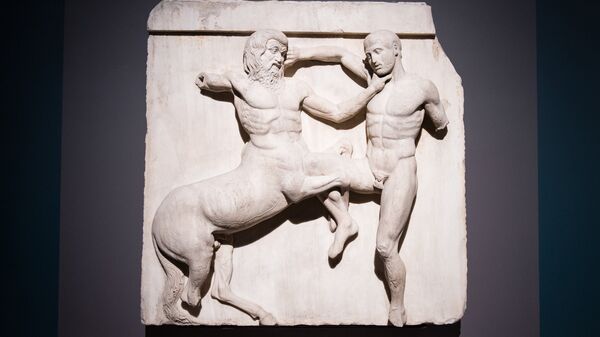The clause in the draft document, which was viewed by Reuters on Tuesday, reportedly includes the stipulation that “Parties should, consistently with Union rules, address issues relating to the return or restitution of unlawfully removed cultural objects to their countries of origin,” as reported by The Art Newspaper.
Although the document didn’t mention any particular objects, it wasn’t long before the Parthenon Marbles were linked to the topic after it was revealed that the clause was added into post-Brexit trade negotiations at the request of Greece.
— Phil Corrigan (@PhilC2010) February 19, 2020
— Kate Dries (@TheSSKate) February 18, 2020
— James Felton (@JimMFelton) February 18, 2020
— Andrew Adonis (@Andrew_Adonis) February 19, 2020
However, since news first broke of the matter, both sides have issued statements indicating that the return of the marbles is not part of any Brexit-related negotiations presently.
“Greece’s request for the return of the Parthenon Marbles remains strong and it is not linked to a Brexit deal,” Stelios Petsas, a spokesperson for the Greek government, told Reuters. “We’ll continue to call for their return and if this is a tool we can use, we’ll consider it in due course.”
As for Britain’s stance, a government spokesperson told Metro UK that the “position on the Parthenon sculptures remains unchanged - they are the legal responsibility of the British Museum.”
“That is not up for discussion as part of our trade negotiations,” they added.
Greece and Britain have been engaged in a longstanding dispute on the matter, as the British Museum has refused to return the 2,500-year-old sculptures, which were removed in the early 1800s from various sites in Greece at the direction of Thomas Bruce, the 7th earl of Elgin, when the country was under control of the Ottoman Empire.
According to the British Museum, Lord Elgin, who also acted at the time as the British ambassador to the Ottoman Empire, removed half of the marbles “with the full knowledge and permission of the Ottoman authorities.”
“Lord Elgin was passionate about ancient Greek art and transported the sculptures to Britain,” reads the museum’s statement on the sculptures. “Their arrival in London was to make a profound impression upon western ideas of art and taste. It promoted the high regard that the European Enlightenment already had for ancient Greek civilisation.”
However, that sentiment has not been shared by the Greeks. Since gaining its independence in 1832 from Ottoman rule, Greece has stayed the course on calling for the return of the sculptures, which are known in Britain as the Elgin Marbles.
In January, ahead of Britain's official departure from the European Union, Greek Culture Minister Lina Mendoni told Reuters that the exit provided the perfect time for the return of the marbles, since the country was “distancing itself from the European family.” She later described Elgin at a conference in Athens as being “motivated by financial gain, publicity and self promotion,” noting that he “deployed illegal and untoward measures … in a blatant act of serial theft.”
Mark Stephens, a lawyer at Howard Kennedy in London who believes the marbles were acquired illegally, told The Art Newspaper,“The only way for Greece to deal with this is to use its economic muscle in this debate.” Stephens further noted that a possible solution would more than likely take place at a “museum level rather than a state level.”
At present, the remaining sculptures from the Parthenon are located in the Acropolis Museum in Athens.

